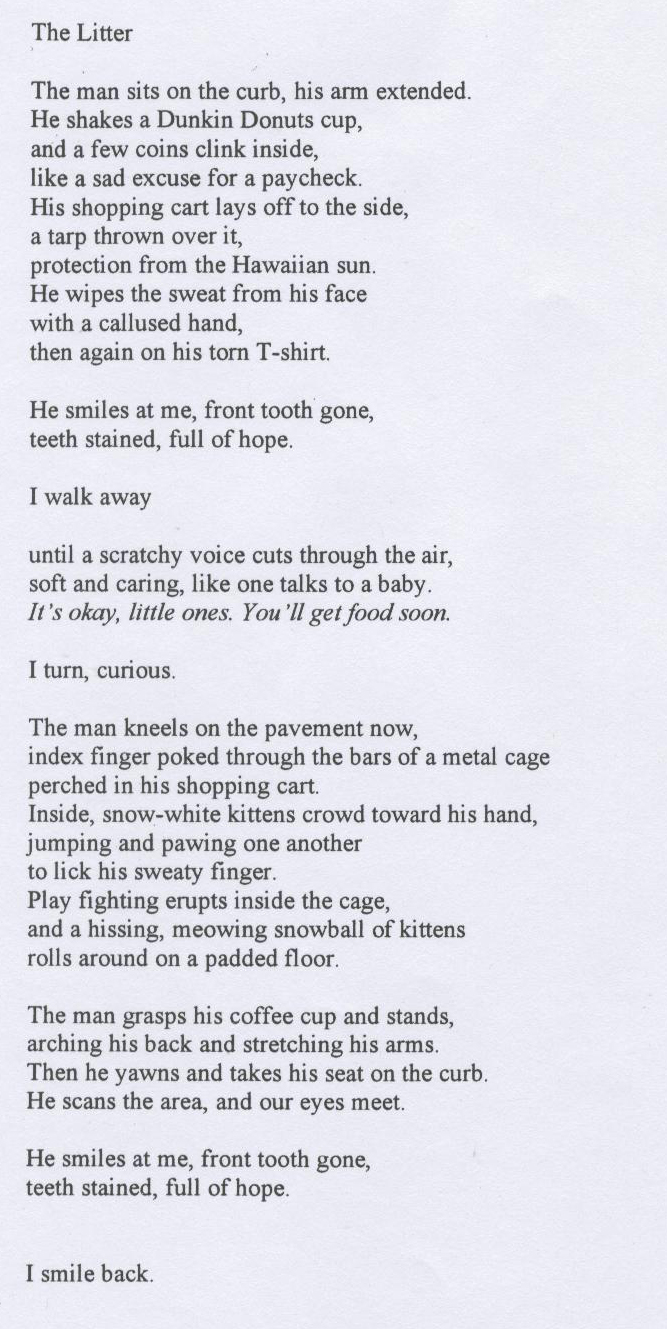2012
SARAH MOOK
POETRY PRIZE RESULTS
6-8 THIRD PLACE
Xander
Bartone
Edgecomb, ME
 |
|
COMMENTS FROM CONTEST JUDGE MARIE KANE: One of the most important aspects of this poem is its description; the reader is able to clearly hear and see the poem's elements. It concerns the byplay between an apparently homeless man who asks for handouts while nurturing a "Litter" of kittens in his shopping cart, and the speaker who initially dismisses the man, and later, accepts him. The first section describes how the speaker meets the man. He "sits on the curb, his arm extended. / He shakes a Dunkin Donuts cup, / and a few coins clink inside, / like a sad excuse for a paycheck." This original simile gives information about the dire straits of the man asking for a handout. The poet then goes on to describe that the man's "shopping cart [that] lays off to the side, / a tarp thrown over it, / protection from the Hawaiian sun." I like that this writer puts the reader into the setting of the poem and gives a definite feel for the climate. Another strong visual appears when the man "wipes the sweat from his face / with a calloused hand / then again on his torn T-shirt." The next short two lines describe the man's actions:
This convincing visual is repeated at the end of the poem. Obviously, the person in the poem is without money, and maybe a home, but not hope. The speaker's reaction to this request for money, like many, is to "Walk away." However, when the writer hears the "scratchy voice". . . "soft and caring" say, "It's okay, little ones. You'll get food soon," he or she turns, "curious" and sees the man kneeling "on the pavement now, / index finger poked through the bars of a metal cage / perched in his shopping cart." What the speaker sees are:
This man's care for the "little ones," these kittens, enables the speaker to realize the man's humanity that he or she had previously decided to ignore. Note the "scratchy voice," of the man and the "hissing, meowing snowball" of kittens that appeal to our auditory sense. In the next two sections, the man's actions bring him into eye contact, again, with the speaker. He "stands, / arching his back . . . / yawns and takes his seat on the curb. / He scans the area, and our eyes meet." The descriptive two lines from earlier in the poem reoccur: "He smiles at me, front tooth gone, / teeth stained, full of hope." At the end of the poem, the speaker's response to this gap-toothed, yet hopeful, smile is different. He or she does not "walk away," but instead, "smiles back." Here we see that the homeless man's care for these "snow-white" kittens reveals his own generous humanity, and elicits a caring response in the speaker. This rewarding poem appeals in its storyline, sensory ability, and overall theme. Thank you for the privilege of reading your work! Marie
Kane |